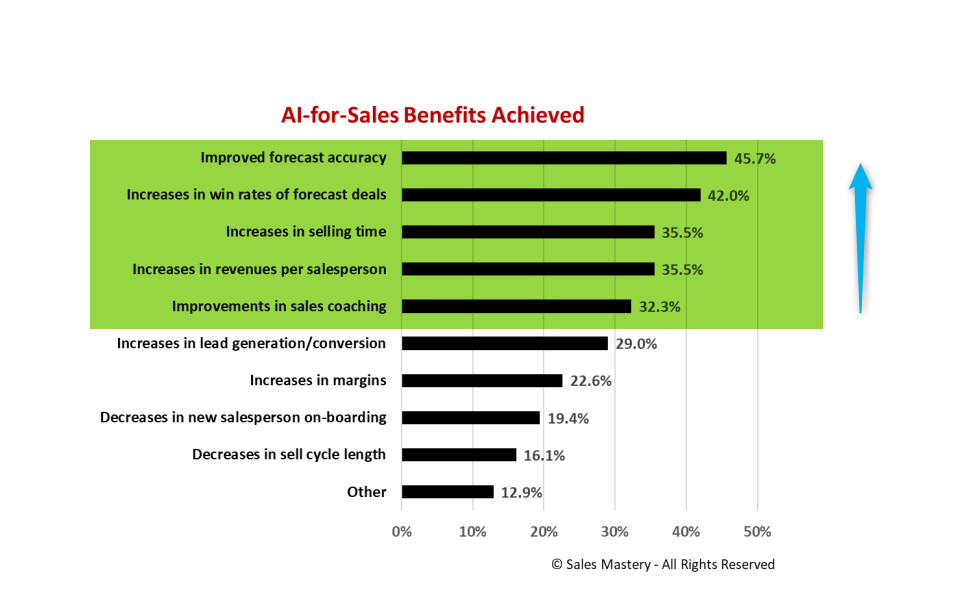The importance of sales practice
I had to give a speech at my sister’s wedding. We’re close and I’m a writer, so I thought, “No sweat! I got this!” I put off writing the speech until a couple weeks before the wedding. And then I never practiced it. Can you guess what happened?
While the words were prepared, I was not. The conditions of the day — standing in formalwear in the sun on a 103 degree day in the Bahamas with no sunglasses (so as not to ruin the pictures), signing the marriage license as a witness and the reality of my sister getting married setting in, the whole crowd (servers included) staring at me and listening intently — caught me off guard and totally threw me off my game.
The delivery was not good. But I did learn a valuable lesson — preparation and practice matter. Especially when what you have to say, and how you say it, is important to the people listening.
Like, for instance, if they’re trying to get the info they need to convince their CFO to drop five to seven figures over several years on a new piece of software that will impact their business.
Your products and messaging might be amazing, but if the people who have to communicate that amazingness to buyers aren’t as prepared as possible, it’s more likely the unpredictable conditions of the day (unforeseen questions, a distracted and disgruntled buyer who has too many meetings that day, someone’s dog barking nonstop at the UPS driver in the background) will spoil their delivery and lose the buyer.
For sellers to be effective in these scenarios, they have to practice. And here’s the important part — practice on real customers is NOT practice. It’s “playing with live ammo,” as Barry Trailer from Sales Mastery put it in our recent webinar, and it impacts your brand, your customers’ experience, and your sellers’ confidence. Hear it for yourself right here:
Building on this discussion with Sales Mastery, I wanted to look into the importance of sales practice, its impact on sales effectiveness, and how AI factors into the equation. Let’s get into it.
Sales effectiveness vs sales efficiency
A keystone of this roundtable and Sales Mastery’s research was their emphasis on sales effectiveness versus sales efficiency, the latter of which has been a popular buzzword the past few years as resources became less abundant in the wake of economic uncertainty.
Compiling years of articles written by sales gurus on the internet about sales efficiency and sales effectiveness, ChatGPT offered up these definitions of the two terms:
Sales efficiency and sales effectiveness are related concepts in the realm of sales performance, but they focus on different aspects:
Sales efficiency:
- Sales efficiency measures how well a company utilizes its resources, such as time, money, and manpower, to generate revenue.
- It assesses the productivity and cost-effectiveness of sales activities, including lead generation, prospecting, and closing deals.
- Sales efficiency is concerned with optimizing the input-output ratio, aiming to minimize resources expended while maximizing revenue generation.
Sales effectiveness:
- Sales effectiveness evaluates the ability of a sales team to achieve desired outcomes, such as closing deals, meeting revenue targets, and satisfying customers.
- It focuses on the quality and impact of sales efforts, including the effectiveness of sales strategies, customer interactions, and relationship-building.
- Sales effectiveness is concerned with achieving objectives efficiently, ensuring that sales activities result in meaningful outcomes and contribute to the overall success of the business.
Comparing the two, it’s clear efficiency is part of effectiveness, but aiming for productivity alone doesn’t add up to sales effectiveness. You’re missing the “add value” part. AKA the part that builds customer trust and closes deals.
A focus on sales efficiency alone also doesn’t jive with another point Barry Trailer and Bigtincan President Patrick Welch made in the discussion — “you need to go slow to grow fast,” in other words, shortcuts don’t work. Hear it from them:
Methods of sales practice: sales coaching vs sales roleplay
Sales coaching
Sales coaching is about practicing delivery of messaging and getting feedback on it. Coaching sessions with a sales and/or enablement manager may also involve discussions about the salesperson’s goals, challenges, and areas for improvement. Coaches might provide advice, share best practices, offer constructive feedback, and help the salesperson develop growth plans.
Sales coaching is best for:
-
- Pitch practice
- Practicing public speaking
- Practice controlling the vibe you put out or how buyers’ perceive you
- Rehearsing messaging and product information
- Getting personalized feedback
- Testing knowledge and delivery
Similar to the relationship between sales efficiency and effectiveness, coaching is only one part of sales practice and should be used in tandem with roleplay to develop well-rounded reps.
Sales roleplay
Sales roleplay, as a step beyond sales coaching, is about putting sellers into the live scenario and dealing with the unexpected. It’s designed to move sellers from drills (coaching) to a scrimmage, providing a safe space for them to practice without being constrained by manager time.
Sales roleplay is best for:
-
- Developing their listening skills
- Developing objection-handling capabilities
- Practice dealing with different personalities
- Understanding nuances in how professionals from different roles and industries interact
- Putting sellers in the buyer’s shoes
- Testing skills and readiness
That’s why tools like RolePlayAI (demoed below) are built to accurately take on buyer personas and concerns, ensuring no two roleplays are the same and providing ever-changing dialogues that make sellers think on their feet.
Correlating sales practice and AI to sales effectiveness
So there are a lot of terms flying around here: sales practice, sales coaching, sales roleplay, sales efficiency, sales effectiveness, sales AI. How does it all fit together?
Jim Dickie of Sales Mastery explains the relationship best in this clip:
Sales Mastery found that using AI for sales practice results in that perfect practice that makes those fruitful sales skills permanent.
More specifically, their research shows the use of AI results in improvements in sales coaching, which correlates with increases in sales effectiveness metrics such as revenue per person, win rates, and even forecast accuracy. Take a look at their results right here:

And here’s Jim Dickie breaking down these results:
While AI on its own isn’t necessarily responsible for these positive changes in sales results, it’s the catalyst that allows sales coaching and roleplay to become regular practice in fast-paced sales cultures.
The most common reason sales practice — whether it’s coaching, roleplay, or both — doesn’t happen in sales organizations is lack of time.
Sales and enablement managers simply don’t have enough time to facilitate and give feedback on sales practice for every seller on their team. Especially now that the manager and enabler to seller ratio is off balance following years of RIFs.
And it’s that practice, made possible by Sales AI, that ensures your buyers don’t feel the pain of being your testing field and your sellers show up more confident and prepared for buyer interactions.
Basically, sales practice + AI = sales effectiveness (which = better sales outcomes).
Putting practice into practice
So, where do your sellers practice? If it’s on your customers, they’re not actually practicing. Which means they aren’t as effective as they could be. And they probably don’t feel great about that.
If I had to go back and do it all over again, I definitely would have practiced my speech.
And yes, some roleplay and coaching would have helped me battle the heat and emotions of the day to show up the way I wanted to. I could have had friends sit in a fake audience and give feedback on my speech. And if that was too nerve-wracking to start with, maybe I could have practiced first with a roleplay AI tool, if it had been available back then.
If you currently have nowhere for your sellers to safely practice, it’s worth your time to make it a higher priority this year. Because even if a deal can’t move forward, you want the buyer to think, “That’s a company I’d like to do business with,” or, “That’s someone I’d want on my sales team.”
Salesforce’s 2022 customer research surfaced insightful feedback in this regard, with “88% of customers saying the experience a company provides is as important as its product or services — up from 80% in 2020.”
And a last note — if you’re going to go to the Bahamas, I don’t recommend doing it in formalwear in July.
